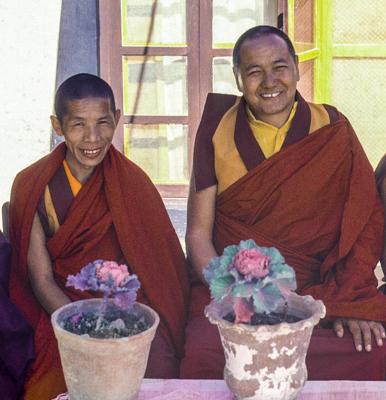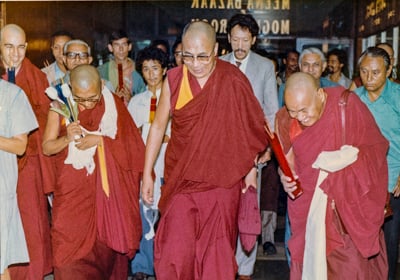Dear Friends,
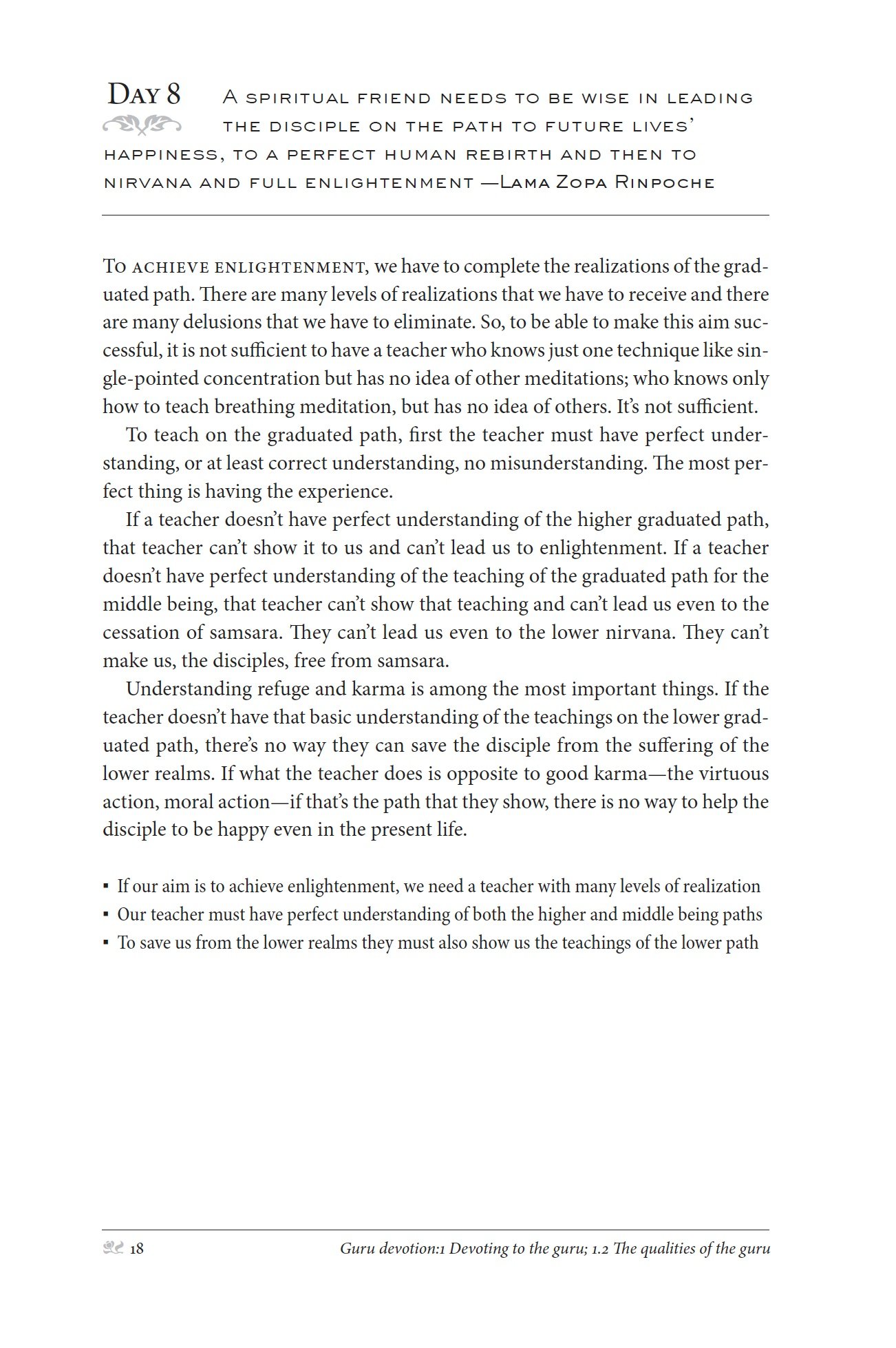 We are already getting lots of positive feedback on our new book, Lama Zopa Rinpoche's letters to prisoners (see next section), and we are moving ahead well on our next book, Lamrim Year, a book of daily contemplations drawn from the teachings of Lama Yeshe and Lama Zopa Rinpoche and based on the lamrim outline. Here's a sample page. Coming soon!
We are already getting lots of positive feedback on our new book, Lama Zopa Rinpoche's letters to prisoners (see next section), and we are moving ahead well on our next book, Lamrim Year, a book of daily contemplations drawn from the teachings of Lama Yeshe and Lama Zopa Rinpoche and based on the lamrim outline. Here's a sample page. Coming soon!NEW LYWA Publication: Enjoy Life Liberated From the Inner Prison
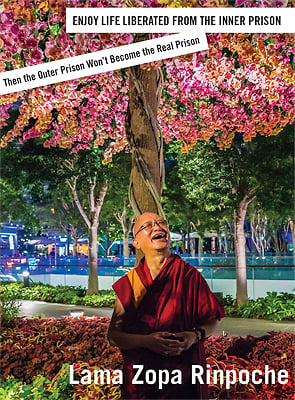 The latest book from Lama Zopa Rinpoche is now published. Enjoy Life Liberated from the Inner Prison: Then the Outer Prison Won't Become the Real Prison is a compilation of more than 100 letters Lama Zopa Rinpoche has written to prison inmates over the years. Compiled and edited by Ven. Robina Courtin, the book has been published as a fundraiser for Liberation Prison Project, a social service project which supports people in prison.
The latest book from Lama Zopa Rinpoche is now published. Enjoy Life Liberated from the Inner Prison: Then the Outer Prison Won't Become the Real Prison is a compilation of more than 100 letters Lama Zopa Rinpoche has written to prison inmates over the years. Compiled and edited by Ven. Robina Courtin, the book has been published as a fundraiser for Liberation Prison Project, a social service project which supports people in prison.
Ven. Robina Courtin has skillfully integrated Rinpoche's advice into a coherent narrative which outlines the path to enlightenment (lamrim). Rinpoche advises inmates that prison is a precious opportunity to develop their potential, to eradicate all delusions and develop the perfection of all wisdom, all goodness—the very meaning of the word “buddha.” This advice is not just for prisoners. It is for all of us. You can read an excerpt in this month's eletter teaching below. Visit this website to purchase your copy and thereby help bring more Dharma to prisoners. Both paperback and ebook copies are available.
From the Video Archive: Gelek Rimpoche on Dharma in the West
This month from the video archive we are happy to share with you an inspiring interview with Gelek Rimpoche conducted by Robyn Brentano at Tushita Meditation Centre as part of the First Enlightened Experience Celebration (EEC1) in 1982. In this comprehensive interview, Rimpoche shares his thoughts about how Western students can approach the Dharma. Camera by Roland Stutz. Read a full description of EEC1 in Big Love: The Life and Teachings of Lama Yeshe, Volume Two, p. 1004 ff, available at www.LamaYeshe.com/BigLove. Learn more about Gelek Rimpoche and read a teaching by Rimpoche on developing single-pointed meditation on LYWA’s sister website Teachings from Tibet.
Visit and subscribe to the LYWA YouTube channel to view dozens more videos freely available from our archive. See also the FPMT YouTube channel for many more videos of Lama Zopa Rinpoche’s teachings.
On the LYWA Podcast: The Emptiness of Sound
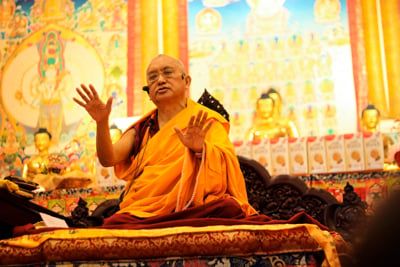 When we hear the sound, we will know what is the hallucination and what is the reality,
When we hear the sound, we will know what is the hallucination and what is the reality,
what is false and what is the truth of our view of the sound.
—Lama Zopa Rinpoche
This month on the LYWA podcast is a short excerpt from a series of teachings given by Lama Zopa Rinpoche at a retreat held at Institut Vajra Yogini, France, from April 18 to May 11, 2003. A torrential rainstorm had begun and Rinpoche takes that opportunity to lead the students in a profound meditation on the emptiness of sound. You can find the transcript of the teachings here.
The LYWA podcast contains hundreds of hours of audio, each with links to the accompanying lightly edited transcripts. See the LYWA podcast page to search or browse the entire collection by topic or date, and for easy instructions on how to subscribe.
What's New On Our Website
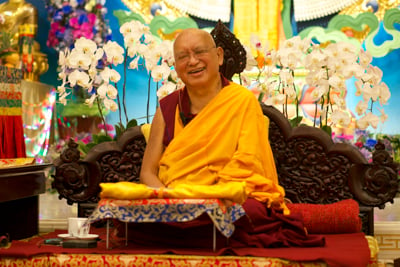 This month we have posted a recent long letter, in which Rinpoche discusses how to resolve complaints and deal with interpersonal conflict at the Dharma center, along with other topics. Rinpoche says the real enemy and the cause of all our problems is the self-cherishing thought, and he provides many quotations which illustrate the need for compassion. You can read shorter excerpts from this letter in Rinpoche’s Online Advice Book. The excerpts are entitled The Power of Bodhicitta, which encourages students to help people affected by COVID-19, Teaching the Good Heart, which Rinpoche says is the most important education, and Why Compassion is Most Important at the Center, where Rinpoche urges students to remember the kindness of mother sentient beings.
This month we have posted a recent long letter, in which Rinpoche discusses how to resolve complaints and deal with interpersonal conflict at the Dharma center, along with other topics. Rinpoche says the real enemy and the cause of all our problems is the self-cherishing thought, and he provides many quotations which illustrate the need for compassion. You can read shorter excerpts from this letter in Rinpoche’s Online Advice Book. The excerpts are entitled The Power of Bodhicitta, which encourages students to help people affected by COVID-19, Teaching the Good Heart, which Rinpoche says is the most important education, and Why Compassion is Most Important at the Center, where Rinpoche urges students to remember the kindness of mother sentient beings.- Visualization While Reciting Amitayus Long-life Mantra: Rinpoche advised these meditations for students reciting the Amitayus mantra. This mantra is beneficial for the long life of our teachers as well as for our own good health, long life and realizations.
- Pilgrimage to Holy Places in Kathmandu: Rinpoche gave this advice about Swayambunath, a sacred site in Kathmandu, Nepal.
- How One Second of Anger Destroys Eons of Merit: Rinpoche warned that getting angry with a bodhisattva, a buddha or the guru for even one second destroys all our merit, results in an unfortunate rebirth and delays our realizations for thousands of eons.
- When Others Harm Us: A student was worried that newcomers would misunderstand a verse on bodhicitta from the practice booklet Method to Transform and see this verse as acceptance of abusive behavior. The student felt that beginners may reject Buddhism and leave.
You can always find a list of all the newly posted advices from Lama Zopa Rinpoche on our website.
Big love,

Nick Ribush
Director
THIS MONTH'S TEACHING: BEING IN PRISON IS AN INCREDIBLE OPPORTUNITY
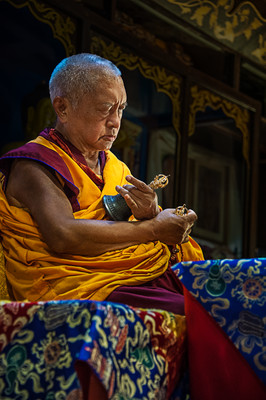 When you use this opportunity to practice, prison will become a place of happiness; there is so much to rejoice in.
When you use this opportunity to practice, prison will become a place of happiness; there is so much to rejoice in.
Prison is a great place for great change
In prison, you can use the Buddhism of the Mahayana tradition to see your bad circumstances as supportive circumstances, just like the Tibetans did. You can transform your suffering and problems into happiness through meditation and Buddhist psychology, especially with the approach known as thought transformation, or, in Tibetan, lojong—the brave attitude of seeing your problems as opportunities for practice—which I discuss in chapters 7 and 10, and which includes meditations like “giving and taking” in chapter 18.
Prison is a great place for developing courage. It is a great place for great change. Compared to being behind the bars of the prison of rebirth as a hell being, a hungry ghost or an animal, your prison is a great place. It is a great place to cease the negative thoughts and actions, which are the cause of rebirth in the lower realms. Realizing this enables you to achieve a higher rebirth in the future by creating virtuous thoughts and actions.
As Nagarjuna said—Nagarjuna is like the second buddha—in his teaching Letter to a Friend:
Actions born from ignorance, anger and attachment are nonvirtue;
From that, all the evil transmigratory beings arise.
Actions born from non-ignorance, non-anger and non-attachment are virtue;
From that, all the happy transmigratory beings arise.
This means that all rebirths as hell beings, hungry ghosts and animals come from nonvirtue, and a perfect human body or birth in Buddha’s pure land, where there is no suffering, come from virtue.
Prison is a great place to learn about samsara and liberation—to discover the causes of samsara, karma and delusions (see chapters 8 and 15); and the causes of liberation, abandoning the delusions and realizing emptiness: realizing how everything is a dependent arising and therefore empty of inherent existence. See chapter 11.
Prison is a great place to not only achieve liberation but also to practice the Mahayana path: to develop patience toward sentient beings, compassion and loving kindness for them; and, with bodhicitta, to develop the special attitude, the universal responsibility to free numberless sentient beings from all the sufferings and bring them to full enlightenment, all happiness, by yourself, alone. See chapters 10, 17 and 18.
And then, finally, by practicing the tantric path one can achieve enlightenment within a number of years in this brief lifetime of these degenerate times. Then you are able to bring all sentient beings quickly to enlightenment.
Think: “This experience of mine, what is called ‘prison,’ is actually a teaching for me, showing me that I must purify the negative karmas that I have collected, all the causes of sufferings, and from now on to not commit those negative karmas again, because otherwise I will experience the same problems again and again.”
Sometimes you can think, “This room is a room in which I can achieve enlightenment. This is a room for me to make my life most meaningful and productive, to prepare for death and to achieve happiness in future lives. This room is made for me to reach liberation from samsara and achieve enlightenment for sentient beings.”
You should look at your situation most positively like that.
All these stages of practice are included in the lamrim, which I explain in chapter 13.
You have woken up
The essence of what I am saying is that you should regard prison as a very special place for you. You can think just like the yogis: “This is not prison; I am in retreat.” In fact, your life in prison can be much happier than an ordinary life outside prison.
Prison has woken you up. You’re now discovering your inner life. You’re seeing your past mistakes—and not just in this life, in your past lives, too. You’re beginning to develop wisdom and compassion.
Because of what you did, the illegal things in the past, now you are in prison, yes. But being in prison purifies the negative karmas collected from beginningless rebirths. Rejoice in that! So please think about that. You can tell this to others, to your friends, if appropriate.
It is said by the great meditator from Tibet, Kadampa Geshe Khamlungpa:
By experiencing this present small suffering,
The past negative karma is ceased
And there will be happiness in the future.
Therefore, rejoice, be happy in this present suffering.
It is great that you have woken up and realized that this perfect human rebirth is a one-time opportunity to practice Dharma and achieve the three great meanings: you can achieve the happiness in this life; the happiness of future lives; and the ultimate happiness, liberation from the oceans of samsaric suffering and the peerless happiness of full enlightenment.
Definitely it is a great thing that you have now met the Buddhadharma. I am extremely happy that, by being in prison, you have opened your heart.
Be happy you’re in prison
I would like to tell you a story. When I first went to Australia, in the 1970s, in my mandala offering set there were some grains of rice from Nepal. The customs people in Australia are very strict. They asked me who packed my bags and so forth and then they opened my mandala and found the grains. They talked with the police and said they would put my name down, and then, with pointing fingers, they said, “Next time, don’t bring grains!” When they wrote my name down, I thought, “I don’t mind if I go to prison, as long as I can practice Dharma.” This is what I thought as I stood in front of the police.
You can feel the same. Change your concept. Think: “Actually, it turned out for the best. What happened is the best thing that could have happened to me. Now I have all the opportunities to practice. If I were not here my life would be full of desire and distractions—parties, people, friends, work and so forth.”
In other words, be happy about being in prison. As I said, normal people in the world, who haven’t met Dharma and don’t practice, look at being in prison only as suffering, only as unhappiness, because they’re not with their family, they’re not free to do what they want when they want—normally, “being free” is what is regarded as being able to do worldly activities whenever you want, with attachment and anger.
But now, for you, thinking in a different way, being in prison becomes Dharma. For others, there is so much unhappiness, but for you it’s very positive. Your future will be like the sun shining in the world—and from this so many people and creatures and animals will benefit.
As a result of your practice, your mental continuum will achieve higher and higher realizations, until you are free from samsara, free from the oceans of samsaric suffering. And not only that, you will be able to cease all the subtle defilements and achieve enlightenment, the complete realizations.
When you practice, you’re not in prison
As long as you are practicing Dharma, you are not in prison. When you practice the entire path—renunciation of attachment to this life, to future lives and to samsaric happiness; the right view of emptiness, the very nature of phenomena; bodhicitta; and on this basis, tantra, which is the quickest path—you are bringing yourself to liberation and enlightenment. All this is covered in the lamrim, chapter 13.
By having this realization, you are no longer in prison. As you become free from all wrong views and concepts, you become liberated: you are no longer a prisoner. Even though ordinary people call you a prisoner because you are in that building, in reality you are not.
The main thing for you is to not see prison—not having freedom—as an obstacle. You should think that you have the best freedom, to free yourself and all beings from samsara by practicing the path. This is the best opportunity!
Every day that you practice virtue you are creating the cause of happiness, to be free from all the emotional negative thoughts and negative karma. Then you are not a prisoner, you are not in prison. But whenever nonvirtuous thoughts arise, and you follow them, you are putting yourself in prison—the prison of wrong concepts.
When you’re not practicing, prison is suffering
Those who don’t see the positive side of prison and therefore aren’t practicing Dharma are so miserable. They see nothing good in prison. Day and night, they are constantly wishing to be free from prison. That is exactly the feeling of never finding any comfort or pleasure in samsara.
When you’re practicing, prison is like a pure land
So, what I’m telling you is to spend your time in prison practicing Dharma. Then it becomes a place of retreat. When you use this opportunity to practice, prison will become a place of happiness, like a beautiful island. There is so much to rejoice in. Develop your mind, transform the situation into happiness. For Christians it becomes like heaven and for Buddhists it becomes like a pure land.
REMEMBER
- Develop courage: use this experience to change your mind.
- Prison is an opportunity to make use of your life.
- It’s wonderful that you’ve woken up!
- When you practice, prison is like a pure land.
- When you don’t practice, prison is such suffering.
Excerpted from Lama Zopa Rinpoche's latest book Enjoy Life Liberated from the Inner Prison: Then the Outer Prison Won't Become the Real Prison, Chapter 3. Compiled and edited by Ven. Robina Courtin and published for Liberation Prison Project by LYWA. Visit this website to purchase a copy of the book and thereby help bring more Dharma to prisoners.
























